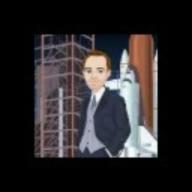Who gave this statement: The earth moves about its own axis?
2016-01-31 10:18 am
回答 (4)
2016-01-31 4:49 pm
✔ 最佳答案
Many Greek philosophers already proposed that Earth rotated over 2300 years ago. However, throughout our Middle Ages, we only had access to writings by Aristotle, who did NOT believe Earth rotated.Galileo's famous (similar) comment was more about the Earth moving around the Sun (eppur si muove); he would have said it at the end of his trial, after he was forced to recant his writings about the Sun, not Earth, being the centre of the universe.
The first proof of Earth's rotation came from Léon Foucault (the guy who made the Foucault pendulum). He used his pendulum to scientifically prove Earth's rotation (1851). Foucault would have been the first human being to say words equivalent to the statement, and be able to back it up with proof. Before him, lots of people could have stated "Earth rotates" but were unable to prove it.
For example, Isaac Newton would have deduced it, following his calculation of the mass of the Sun. Applying his mathematical formulas for gravity, he would have calculated that Earth moves around the Sun at such a distance, that only a rotating Earth could explain day and night. However, he had no proof to offer. On the other hand, if Newton has issued the statement, he could have been the first one to have made it in English (around 1690).
The one who came closest was Gustave de Coriolis who worked out the effect (back then, it was called a force) that explains how Earth's rotation affects the movement of winds around high pressure and low pressure centres. However, the explanation of linking Earth rotation and Coriolis effect was only done after Foucault's proof (even though Coriolis lived well before). Gustave only provided the mathematical model explaining the apparent deflection of an inertial trajectory, in a rotating frame of reference (in other words, Gustave himself did not link his model to Earth's rotation -- it was done much later in the late 1880s).
2016-01-31 11:06 am
2300 years ago this was known to the Greeks.
They computed the size of the earth and realized that it turned on its axis.
It is not known who first realized it.
Certainly Eratosthenes knew it in about 200 BC.
https://en.wikipedia.org/wiki/Eratosthenes
They computed the size of the earth and realized that it turned on its axis.
It is not known who first realized it.
Certainly Eratosthenes knew it in about 200 BC.
https://en.wikipedia.org/wiki/Eratosthenes
2016-01-31 10:36 am
When first propounded it would not have been in English,
2016-01-31 5:16 pm
I did, Thursday, tutoring a kid in a math problem... It bothers me that someone was eavesdropping...
收錄日期: 2021-04-21 16:36:17
原文連結 [永久失效]:
https://hk.answers.yahoo.com/question/index?qid=20160131021830AAFmzSf

